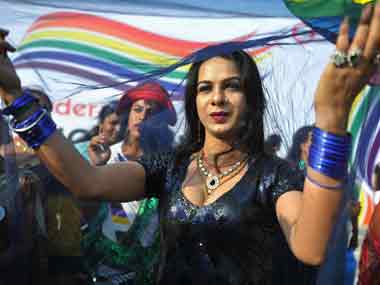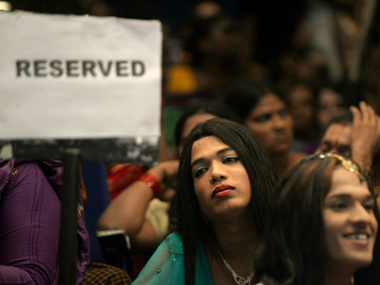The Supreme Court today recognised transgender persons as a third sex in the country and said the community was as backward as socially and economically backward classes. Hearing a petition filed by the National Legal Services Authority, the apex court today directed the central and state governments to provide healthcare and education to members of the community on account of their backwardness. [caption id=“attachment_1480783” align=“alignleft” width=“380”]  Image used for representational purposes only. AFP[/caption] A bench of Justice KS Radhakrishnan and Justice AK Sikri had reserved its judgement on the petition which had sought that members of the community get equal rights. The apex court said that trangenders were respected earlier in the society but situation has changed and they now face discrimination and harassment. It said that section 377 of IPC is being misused by police and other authorities against them and their social and economic condition is far from satisfactory. The bench clarified that its verdict pertains only to eunuchs and not other sections of society like gay, lesbian and bisexuals who are also considered under the umbrella term ’transgender’. The bench said they are part and parcel of the society and the government must take steps to bring them in the mainstream of society. The apex court passed the order on a PIL filed by National Legal Services Authority (NALSA) urging the court to give separate identity to transgenders by recognising them as third category of gender. Welcoming the Supreme Court decision, Lakshmi Narayan Tripathi, transgender rights activist said, “the progress of the country is dependent upon human rights of the people and we are very happy with the judgement as the Supreme court has given us those rights.” [caption id=“attachment_1480599” align=“alignleft” width=“380”]  The court’s decision is expected to come as a relief for the community. AFP[/caption] NGO Lawyers Collective had appeared on behalf of transgender rights activist and former Bigg Boss contestant, Tripathi, and argued that a person may identify in a gender that doesn’t correspond with the sex assigned at birth. Senior lawyer and head of Lawyers Collective, Anand Grover argued before the court that everyone has a right to be recognised in their chosen gender, said the NGO. Grover also argued that gender identity shouldn’t be dependent on medical requirements and members of the community should also have access to free and quality health services. The lawyer cited Articles 14 and 15 ( equality and non-discrimination), 19 (fundamental freedoms) and 21 (right to life) of the Constitution to argue that transgenders were entitled to all identity documents issued by the state and central governments including a birth certificate, passport, voter identification card and driving license. The central government, through the Ministry of Social Justice and Empowerment, reportedly submitted that they were in principle in support of the petition and had also set up an expert committee to look into issues concerning transgenders.
The apex court said that centre and state governments should provide all facilities to the community.
Advertisement
End of Article


)

)
)
)
)
)
)
)
)



